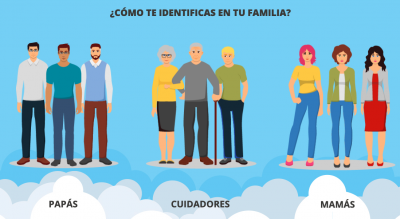ITA, co-founded by a Gillings student, offers support to Spanish-speaking parents during COVID-19
May 12, 2020
The website papita.org is home to ITA, an artificial intelligence program that offers unique childcare tips to Spanish-speaking users based on their personal information. The site’s developers hope to promote healthy family habits while lowering parents’ stress — especially now that the COVID-19 pandemic has families on lock down at home.

Dr. Juan Carlos Caro
ITA was co-founded by Juan Carlos Caro, PhD, a 2020 health policy and management graduate of the UNC Gillings School of Global Public Health. A native of Chile, he used his dissertation as an opportunity to explore child development on a population level. In collaboration with the Chilean Ministry of Education, he processed data sets that included assessment information for every child enrolled in public school across the country.
In the course of his research, he recognized how critical the early determinants of health, such as parenting behavior, are to children’s outcomes later in life.
“I started out obsessed with the question of whether school lunches mitigate or contribute to children’s obesity risk. We have a huge issue with obesity in Chile,” Caro says. “Through my research, I ended up learning that parents actually have an enormous effect on their children’s continuing risk. When parents interact with their children more often, it improves children’s emotional stability and lowers their risk of obesity.”
In response to this insight, he put together a team of experts and created the Papita website — with a phone app pending — to translate his findings into simple-to-use tools for parents, children, school workers and other researchers.
“We built a very simple AI,” says Caro. “There’s a lot of code behind this website, but all parents will see is a short questionnaire that gives the AI a sense of their baseline skills and how they perceive themselves as a parent. Based on that, it delivers tools for mastering new skills.”

How do you identify within your family — as a father, caregiver or mother?
Site users indicate whether they are a mother, father or other caregiver (the last category has a special focus on grandparents). A user’s role changes their experience, because the Papita team wanted to acknowledge that different kinds of caregivers need different strategies to succeed.
The site content includes videos and written materials created by various experts and organizations. The interdisciplinary ITA team includes a specialist in child development and a practicing psychologist who divide the content by age group and skill type.
The three skill categories include physical activity, healthy eating and mindfulness, and caregivers can progress through the experience at their own pace while the AI adjusts the tools it suggests to match user-reported changes in stress levels. The ultimate goal, Caro says, is for parents to adopt positive health behaviors and model them for their kids in the home.
“We have focused all our marketing on the basic truth that parenting is hard, especially during this pandemic,” he shares. “We want parents to have a positive user experience — nothing about this tool should make their lives harder. Everything we do is based in reducing negative feelings and boosting parents’ sense of accomplishment and connection with their kids.”
Caro originally planned to roll out ITA through the Chilean government, but the arrival of the novel coronavirus changed his timeline.
“When the pandemic hit, we realized that people need this tool now more than ever, and it wouldn’t be ready in time unless we pushed it.”
With that outlook, Caro and his team volunteered their time and personal funds to create the website as quickly as possible. They expect to receive their first external funding in the next month and plan to funnel it into a social media campaign throughout Chile. Eventually, the Chilean Ministry of Health will send the tool directly to schools for dissemination.
Meanwhile, the ITA team hopes to promote their tool in other Spanish-speaking countries soon — and they’re open to working with collaborators to make an English-language version. They also plan to add an element of diversity and inclusion through a community support feature that will group users together via shared interests rather than age, race or other common identifiers.
Contact the UNC Gillings School of Global Public Health communications team at sphcomm@unc.edu.
